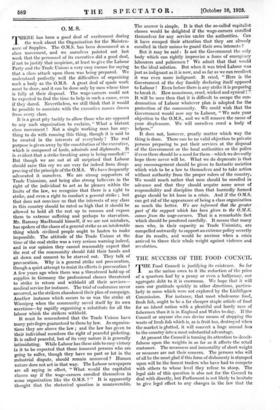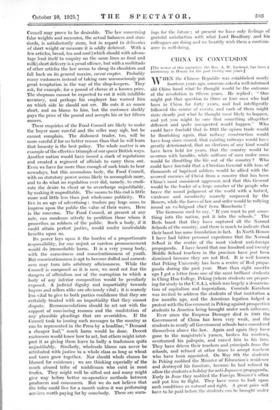THE SUCCESS OF THE FOOD COUNCIL
THEFood Council is justifying its existence. So far as the nation owes to it the reduction of the price of a quartern loaf by a penny or even a halfpenny, our aggregate debt to it is enormous. We hope that it will earn our gratitude quickly in other directions, particu- larly in some which were not explored by the Linlithgow Commission. For instance, that most wholesome food, fresh fish, ought to be a far cheaper staple article of food for an island nation with a plentiful and hardy race of fishermen than it is in England and Wales to-day. If the Council or anyone else can devise means of stopping the waste of fresh fish which is, as is fruit too, destroyed when the market is glutted, it will convert a huge annual loss to the country into a most substantial advantage.
At present the Council is turning its attention to deceit- fulness upon the weights in so far as it affects the retail customer. The meanness and immorality of short weight or measure are not their concern. The persons who will of all be the most glad if this form of dishonesty is stamped upon will be the honest traders who have had to compete with others to whose level they refuse to stoop. The legal side of this question is also not for the Council to deal with directly, but Parliament is not likely to hesitate to give legal effect to any changes in the law that the Council may prove to be desirable. The law concerning false weights and measures, the actual balances and stan- dards, is satisfactorily stern, but in regard to deliveries of short weight or measure it is oddly deficient. With a few articles, bread, tea and coal (which should with advan- tage lend itself to enquiry on the same lines as food and milk) short delivery is a penal offence, but with a multitude of other articles the law seems to shrug its shoulders and fall back on its general maxim, caveat emptor. Probably many customers instead of taking care unconsciously put great temptation in the way of the shop-keepers. They ask, for example, for a pound of cheese at a known price. The shopman cannot be expected to cut it with infallible accuracy, and perhaps his employer has warned him on which side he should not err. He cuts it an ounce short, and no blame to him, but the customer slackly pays the price of the pound and accepts his or her fifteen ounces.
These enquiries of the Food Council are likely to make the buyer more careful and the seller may sigh, but he cannot. complain. The dishonest trader, too, will be more careful if for no better reason than that he will learn that honesty is the best policy. The whole matter is an example of the effective triumph of our queer British ways.
Another nation would have issued a stack of regulations and created a regiment of officials to carry them out.
Even we have far more than enough of such trials to bear nowadays, but this anomalous body, the Food Council, with no statutory power seems likely to accomplish more, and to do what no regulation ever did, namely, to eradi- cate the desire to cheat or to overcharge unjustifiably, by making it unprofitable. The means to this end is little more and little less than just wholesome publicity. We live in an age of advertising : traders pay huge sums to impress upon the public the value of their wares. Here is the converse. The Food Council, at present at any rate, can condemn utterly to perdition those whom it proscribes as robbers of the public. Such a body, if it could attain perfect justice, would confer incalculable benefits upon us.
Its power lays upon it the burden of a proportionate responsibility, for one unjust or careless pronouncement would do irremediable harm. It is a very young body, with the earnestness and conscientiousness of youth. But conscientiousness is apt to become dulled and earnest- ness may turn into arbitrary officiousness. While the Council is composed as it is now, we need not fear the dangers of officialism nor of the corruption to which a body of any inferior composition would be peculiarly exposed.. A judicial dignity and impartiality towards buyers and sellers alike are obviously vital ; it is scarcely less vital to give to both parties confidence that they are certainly treated with an impartiality that they cannot dispute. Recommendations should be set out with the support of convincing reasons and the confutation of any plausible pleadings that are overridden. If the Council took to issuing such messages to the country as can be represented in the Press by a headline, " Demand a cheaper loaf," much harm would be done. Decent customers would know how to act, but others might inter- pret it as giving them leave to bully a tradesman quite unjustifiably. Similarly, 'wholesale blame can never be attributed with justice to a whole class so long as wheat and tares grow together. Nor should whole classes be blamed for existence ; we are thinking especially of the much abused tribe of middlemen who exist in most trades. They might well be sifted out and many might give way before better co-operative methods between producers and consumers. But we do not believe that the tribe could live for a month unless it was performing services worth paying for by somebody. These arc warn- ings for the future ; at present we have Only feelings of grateful satisfaction with what Lord Bradbury and his colleagues are doing and we heartily wish them a continu- ance in well-doing.



























































 Previous page
Previous page